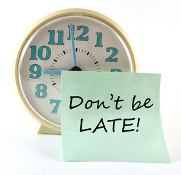 It was close to a quarter-century ago when “The Simpsons” first hit our boob tubes with the most hilarious high jinks a family of middle-class satirists could go through.
It was close to a quarter-century ago when “The Simpsons” first hit our boob tubes with the most hilarious high jinks a family of middle-class satirists could go through.
A little over 500 episodes later, we’ve all been made wiser (and more humorous) with countless lessons: don’t steal candy from a baby while armed (episode #128); don’t eat peppers grown in Guatemalan insane asylums (episode #162); and always submit your insurance payment on time (episode #431).
“How the Test Was Won”
The consequence of that last lesson: a high-wire act of keeping your uninsured self safe from accidents. Homer Simpson learned just as much in “How the Test Was Won,” an episode in which he arrives too late to Balloon Payment Boulevard (har har) to turn in the insurance payment due to his carrier, Blue Umbrella Insurance (har har again).
Spoofy digs about insurance kick off the episode, as Marge presses Homer to remember to turn in a payment to their insurer. Homer replies, “Absolutely, insurance is the greatest deal ever: if I get hurt, I get paid. And—man—do I get hurt!”
Viewers are then treated to a flashback cataloging Homer’s greatest injuries. Vehicle-involved mishaps include Homer getting his head used as a speed bump, getting flattened by Marge’s orange station wagon, and jumping out of, then rolling back into, his friend Moe’s car as he fails miserably at a ploy to fabricate a stolen-car claim.
Back in the “Test” episode, Homer gets the payment to his insurer’s offices but finds it closed until 3 p.m.—meaning the titular family’s fumbling father has until then to avoid all claim-worthy incidents.
He puts the payment in the insurer’s mailbox scrawled with a Homer-like note: “Dear stupid insurance company, I meant to mail this on time. What do you mean too bad? Screw you!”
After driving as carefully home as possible, Homer has to deal with a frazzled Marge who freaks about her husband’s lapse in coverage and convinces him to stay put at the safest place she knows: her book club meeting.
During the book club, Homer can’t help his imagination run wild again as the clock ticks toward 3 p.m. It’s 50 seconds past 2:59 p.m. when Mrs. Skinner drops a knife that Homer can’t stop from ending up in Mr. Burns’s head.
But, looking at the clock, Homer sees it’s 3:01 p.m—he’s covered again.
So what does this episode teach you about your own insurance coverage? Unexpected gaps in coverage can be a real pain.
Could It Really Happen?
The concept of Homer’s half-day coverage lapse may sound absurd, but isn’t that far off from real-world situations that policyholders encounter.
Joan Zubiate, an insurance agent with California-based RDS Insurance Brokers, said the wording of policy contracts is often specific with coverage periods, down to time and date.
“Policies cancel at 12:01 a.m. on the cancellation date, and a lot of people don’t realize that,” she said. “So payments have to be received before the close of business on the business day before the date of cancellation.”
So what happens if your policy’s cancellation date is Sept. 18 and you send in your payment on Sept. 18?
“When you wake up the morning of the 19th, you have no coverage,” Zubiate said.
According to Zubiate, instances of coverage lapses get especially messy when “other parties with bodily injury claims are involved.”
“That’s because you’re talking about other people’s loss of injury or property, and that’s typically when lawyers get involved,” she said.
It depends on which of the many car insurance companies you have, but several warning notices are sent to policyholders before a cancellation notice, according to Zubiate. She also said that some send a final notice before canceling a policy; her own brokerage also places a reminder telephone call for policyholders.
“If you don’t pay your gas or water bill, it gets cut off by the gas or water company, and those companies actually give less warning than insurers,” Zubiate said.
So the lesson learned here from Homer and his high jinks? Pay attention, read your policy and plan ahead, or you might find yourself repeating Marge’s lines from the episode:
“Oh my god, oh my god! We’re totally liable!”